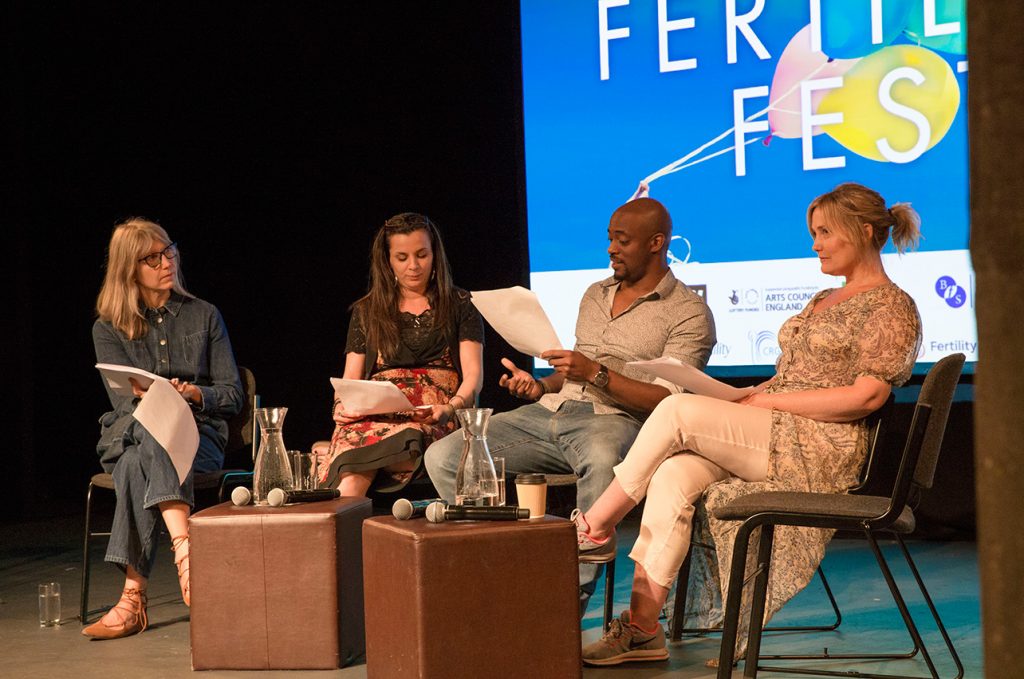Following on from the previous post exploring the first pillar of Fertility Fest’s social mission — improving patient support — in this post we’ll look at the second pillar:
2. To improve the level of public conversation about infertility and reproductive science — what it can do, what it cannot do and how it’s affecting the way the human race is being made.
Public Discourse
Since the inaugural Fertility Fest in 2016, the way we talk about infertility in public discourse has transformed:
Then
Infertility was still mostly spoken about in hushed tones. When infertility was covered in the media, it would invariably be a celebrity headline or an ‘our IVF struggle…..but here’s our miracle baby!’ feel-good story. Conversations were happening, but they weren’t exactly normalised.

Now
The explosion in how we talk about infertility in the last 3 years has been breathtaking.
Infertility stories are regularly covered in the media: although the obligatory miracle baby stories are still a firm favourite, subjects like male infertility are being explored less infrequently and less insensitively.
Surrogacy and donor conception are in the headlines — although still dominated by celebrity stories, they’re opening the door to moving this subject out of the fringes.
We’re starting to have a more honest conversation about egg freezing, digging under the surface to discuss the pros and cons of taking out a fertility insurance policy: whether it’s the next era in reproductive freedom after the introduction of the pill, or whether it’s the fertility equivalent of PPI (or perhaps both).
As well as a plethora of podcasts about infertility from independent producers, 2018 saw infertility podcasts from BBC Radio 4 and BBC Five Live. Film dramas like ‘Private Life’ and ‘Only You’ centred on couples going through IVF, whilst Nina Raine’s play ‘Stories’ at the National Theatre explored deciding to have a baby as a single woman. Infertility is out of the proverbial closet: it’s no longer a taboo subject, and becoming a part of our mainstream cultural fabric.
Next
The public discourse has totally transformed, and understanding of the pain of infertility is changing.
But that doesn’t mean there aren’t new taboos that need to be settled — huge changes in reproductive science are changing the way the human race is going to be made.
And these raise difficult questions — both difficult to discuss, and difficult to address.
Questions about who has the right to have a baby. Questions about the rights and welfare of the child. Questions about morality and ethics. Questions about fertility regulation in a globalised world. Questions about funding.
Questions like these:
Genetic technology Questions about CRISPR technology for gene editing and 3 person IVF: are we opening the door to designer babies? How should this be regulated — particularly in a global world? What about the use of pre-implantation genetic screening for sex selection? Where’s the boundary between individual choice and eugenics?
Surrogacy Questions about the ethics and legalities around surrogacy: should the UK lift the ban on commercial surrogacy? How should it be regulated? How do we legislate for couples simply travelling abroad to rent the wombs of poorer women in countries like Georgia and the Ukraine? Should the NHS fund IVF for women with uterine infertility to use with surrogacy? Should the NHS fund IVF for same-sex male couples to use with surrogacy?
Donor conception Questions about egg, sperm and embryo donation: what is our responsibility to donor conceived children to know their genetic origins? Will attitudes change once the first cohort of donor-conceived children have the right to receive identifying information about their donors in 2023? Should the NHS fund donor sperm or eggs?
Alternative families Questions about reproductive technology and how it’s used: does being in a same-sex relationship qualify as a medical issue for the purposes of receiving public funding for fertility treatment? Should the NHS fund fertility preservation for transgender patients to freeze eggs or sperm before undergoing medical transition?
Womb transplants Questions about the safety and ethics of womb transplantation: what are the risks to the foetus? What are the long-term effects of the immunosuppressant drugs needed to prevent organ rejection? What is our responsibility to the welfare of the child? Who should be eligible for womb transplants? Should organ donors be able to opt out of donating their uterus? Who should pay?

What does it mean to be human when technology is changing everything? Technology is amazing and opens the door to so many possibilities. But with great power comes great responsibility. Just because we can, does that mean we should?
We can only tackle these issues if and when we break the taboos around discussing them — by asking the difficult questions, and talking more openly and honestly about difficult subjects. We all have the right and responsibility to have our say.
Will you join us in the conversation?
After all, it’s how the human race is (and isn’t) being made.
We hope you’ll join the conversation to discuss these important issues — please do email your comments to hello@fertilityfest.com, get in touch on social media, or join us at Fertility Fest to share your thoughts.
This is the second post in a three-part series on Fertility Fest’s social mission
Prev:
Part 1 — Patient Support To improve understanding of the emotional journey of people who struggle or go on a complex journey to conceive
Next:
Part 3 — Fertility Education and Modern Families To improve fertility education — young people need to learn more than how ‘not to get pregnant’